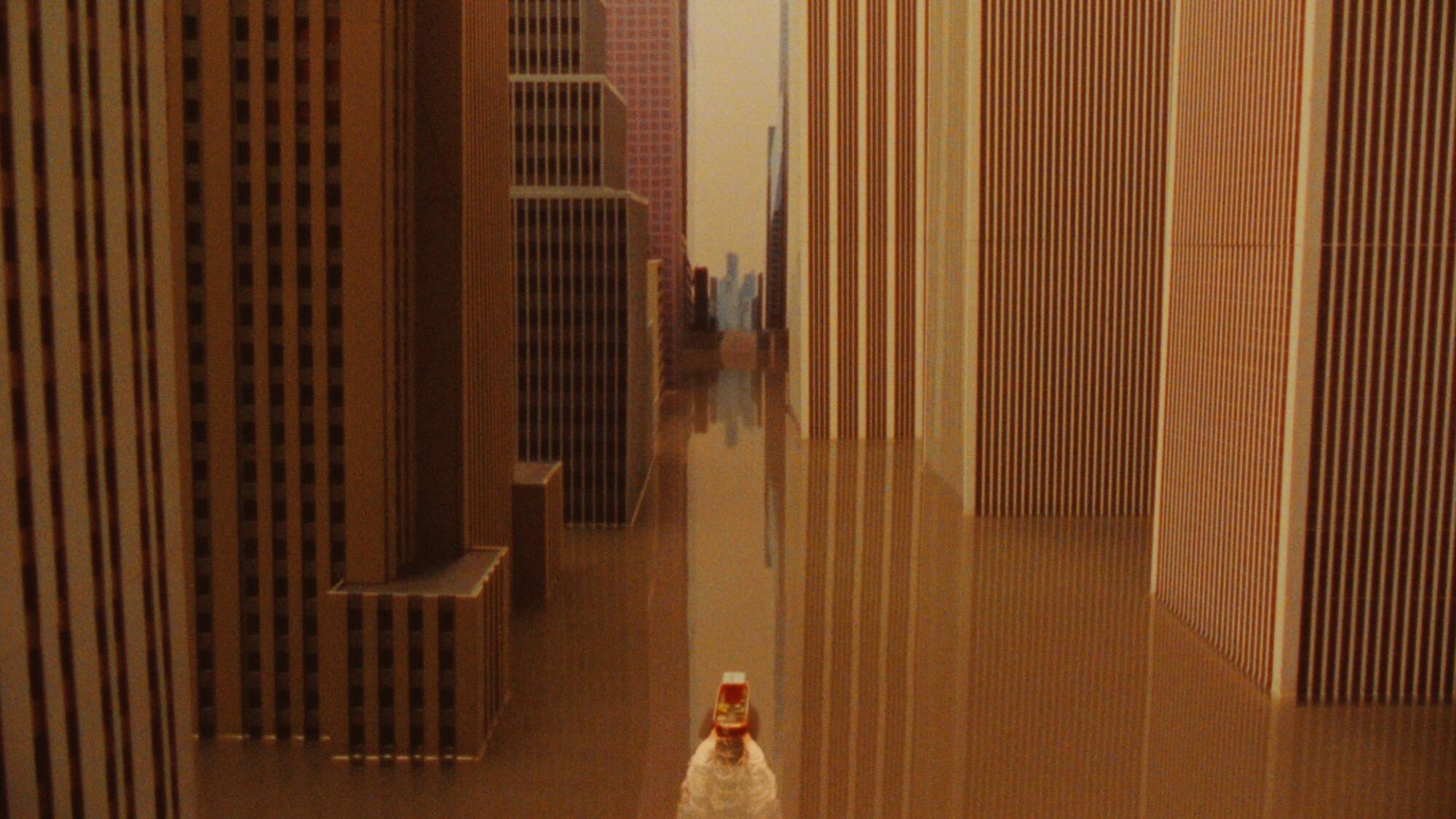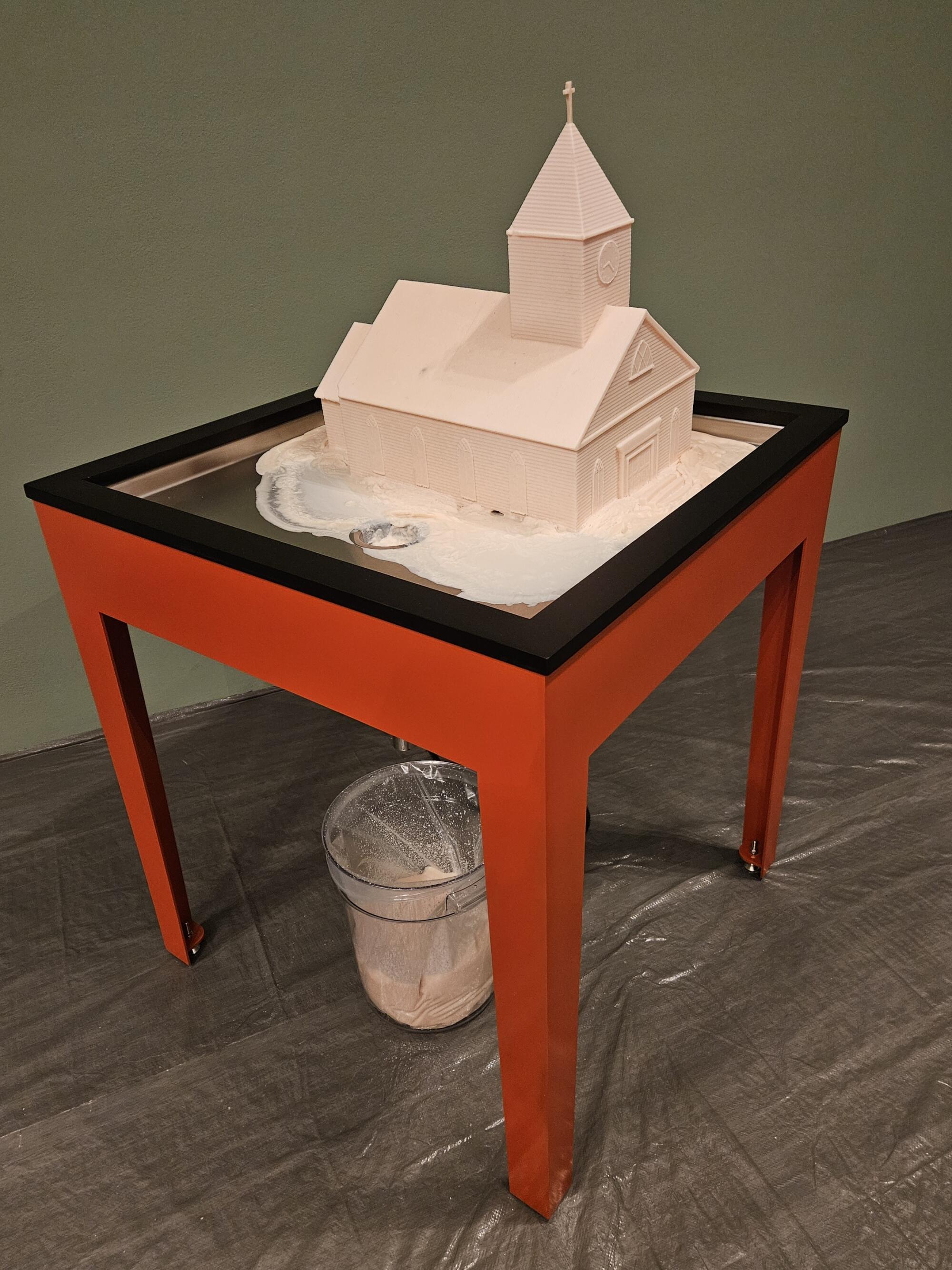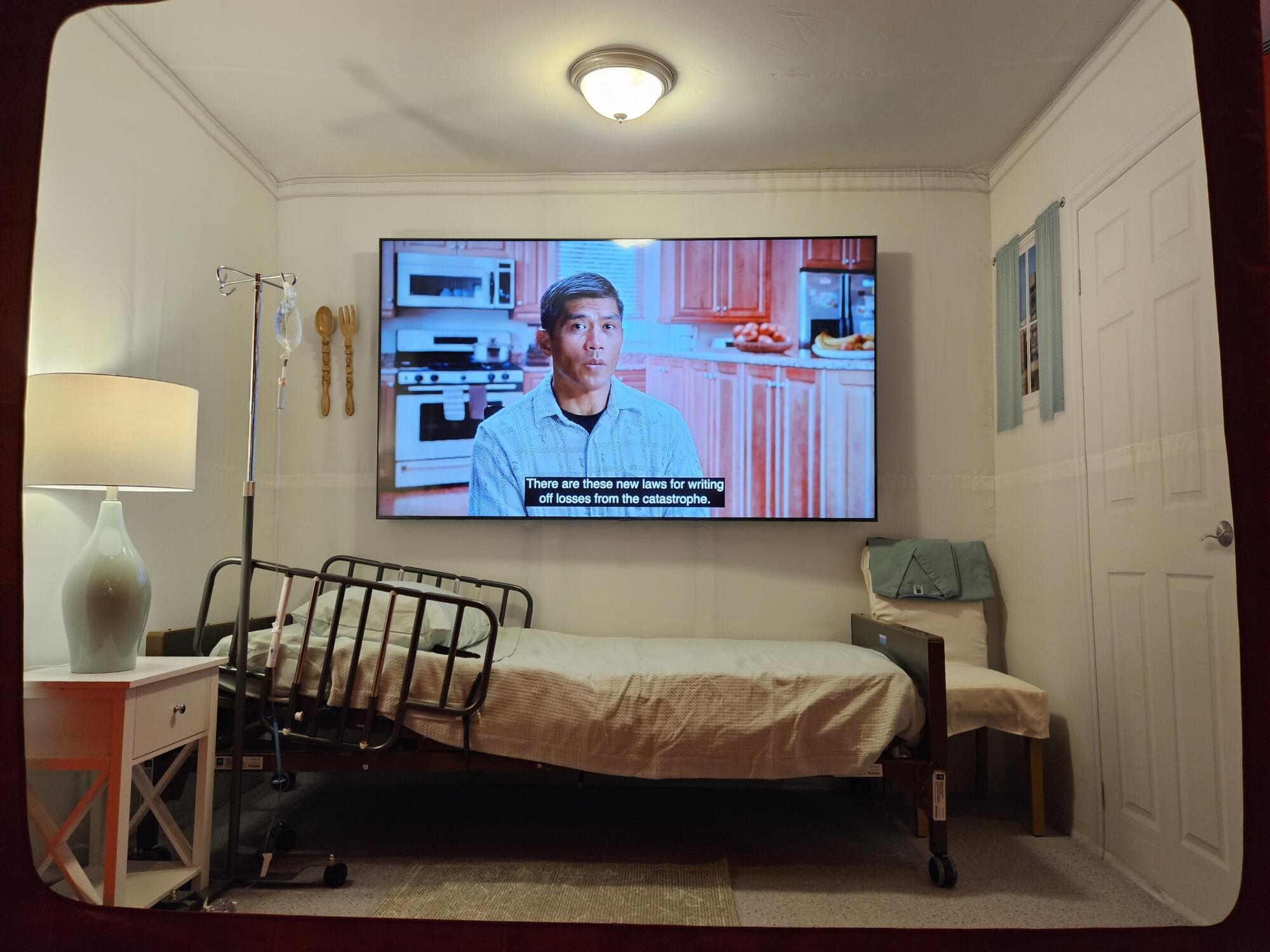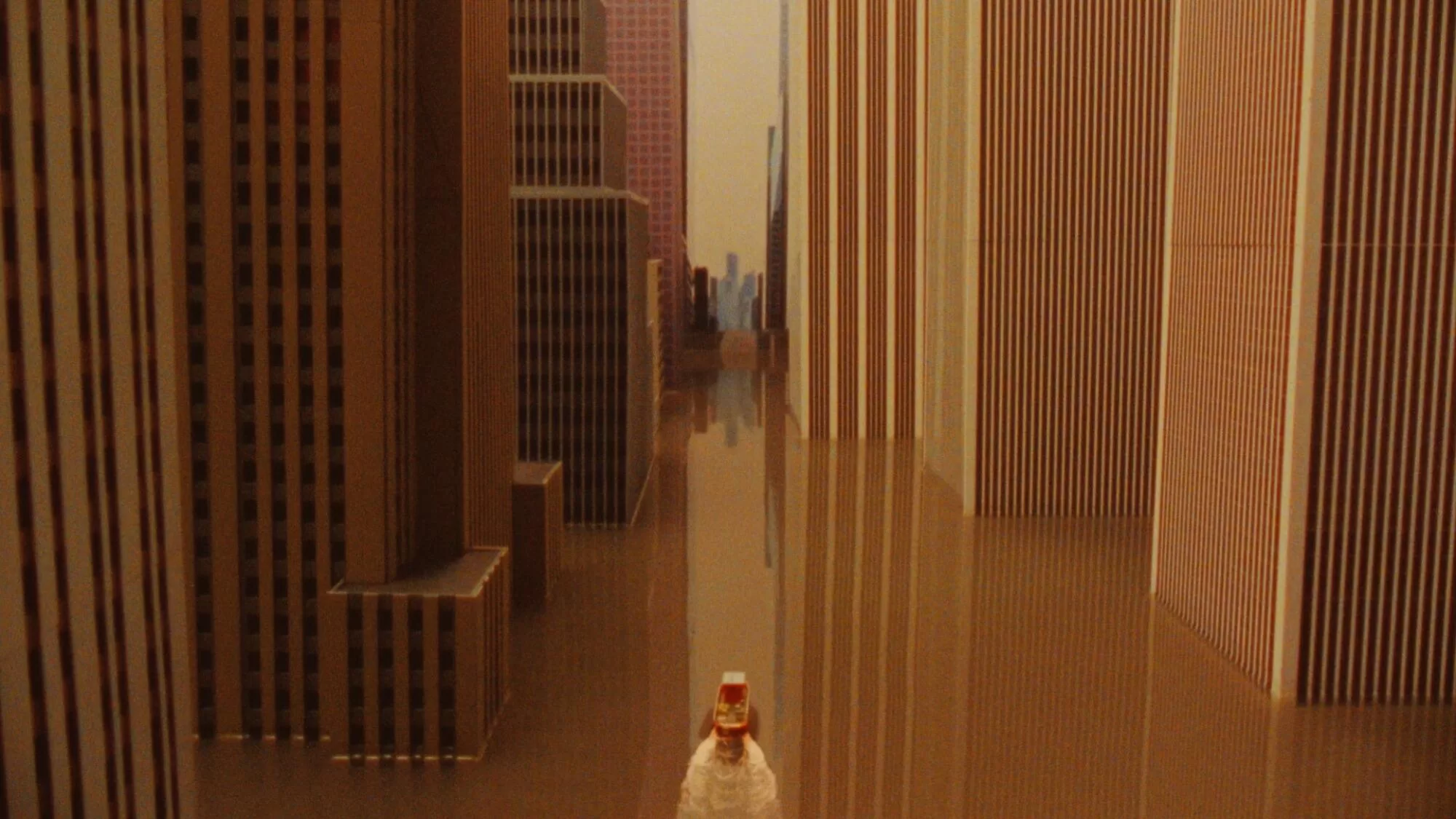Those extreme stakes make a sprawling new exhibition at the Museum of Contemporary Art at once timely, tantalizing and, unfortunately, altogether unsatisfying. “Josh Kline: Climate Change” is a letdown. Informed and deeply committed, it’s also strangely bloodless — more an informative, science fair-like show and tell. The anemic immersive installation hits routine and familiar targets without upending stalled or opaque perceptions, which is what’s needed.
The show was organized by MOCA associate curator Rebecca Lowery and curatorial assistant Emilia Nicholson-Fajardo. Kline, 47, a Brooklyn-based artist, has built six rooms inside the museum’s Grand Avenue building for sculptures and installations he’s been making for years. The sequence of galleries is introduced by an antechamber fronted by a large blank wall featuring two closed doors, each embedded with tattered fragments of British and American flags. The legacy of the Industrial Revolution and Anglo-American empires is announced. A gallery attendant invites visitors to choose whichever exhibition entrance they want.
It’s a “Lady, or the Tiger?” set-up, implying an apparently random choice between happiness and doom as yet unseen on the other side. But within, nothing so emotionally freighted materializes. Instead, it just opens to a big room where three relatively bland fish-tank sculptures and a row of refrigerator-freezers await. The pointless pair of doors is artistically flat, a harbinger of things to come.
The tanks, skewed from an ordinary rectangular shape to an angled parallelogram, each hold a sculptural model of a cityscape — New York, Washington, D.C., and, judging from the architecture, what appears to be a mash-up of Beijing, Chicago, San Francisco and other global urban sites. The models, brown and crusty, perch atop placid water that laps into their territory.
Floating ice sculptures (a polar bear, an SUV) slowly melt, adapting to the room’s environment. Recalling icebergs impinging on these Titanic cities, the melting forms steadily raise the tanks’ implied sea-level. The playful ice sculptures, hardly party decorations, will presumably be restocked from the nearby freezers after they fully puddle.

(Museum of Contemporary Art)
Flash-forward to a darkened room all the way at the end of the exhibition, and a loop closes. “Adaptation” — a silent, 16mm film, 10 minutes long and shot mostly in close-up — fills a wall, animated by the incessant clatter of an exposed projector. Young male and female scuba divers clamber over low walls onto a skyscraper’s upper-level terrace, pulling themselves out from deep water that has risen to engulf generic city streets as far as the eye can see.
Where the divers have been and what they face going forward are histories and fates not disclosed. They silently put their stuff away inside storage bins, mill about, munch on food bars. A pallid eternal-present menaces — but soon, it dawns that the film depicts life as might be imagined back in those inert urban fish tanks we saw in the first room.
Is this all there is? Monumental ennui?
In between, Kline piles on the cliches. One room features warming tables disguised as kitchen sinks that hold sculptures — a house, a church, shops — made of melting soy wax. Domestic life, religious life and consumer life are sliding down the drain. The next room is just as trite, with several vaguely industrial display cases housing assorted dollhouse furniture submerged inside glass bowls, as if remnants of past existence are being stored for future examination.

Josh Kline, “Religious Fragility Meltdown,” 2023, mixed media
(Christopher Knight / Los Angeles Times)
These platitudinous sculptures made me wince, and not because of what they portend for a society that has so far largely fiddled as everything begins to burn. Does art get more banal and prosaic than this?
It turns out that, yes, it does. The tepid show’s largest room, painted a flaming red orange for those who might not yet have a clue, presents eight tent-like enclosures tricked out with stage sets that suggest a hospital room, an Amazon warehouse storage space, an automobile interior and more. Each features a short narrative video in which an inquiring off-screen voice questions an actor playing a character from the unspecified future, who is suffering assorted consequences of the climate catastrophe. They’re exposition dumps, a sci-fi screenplay equivalent of a term paper’s footnotes explaining the causes and ramifications of climate change. Feeling roughly zero empathy for these poor souls is at the very least counterproductive.
This is a show with the emotional tenor of doomsday preppers and dystopian survivalists, albeit without the cockeyed conspiracy theories. In one video-tent, a tightly wrapped bundle of Levi’s 501 jeans burns. In another, smoke is swallowed back inside a factory’s belching chimneys. The videos show events being run in reverse, smoke and flames being absorbed by the denim wad and into industry’s innards. It’s as if the implications of the onrushing climate disaster are headed backward in time but toward us in space, while we’re sitting in a chair calmly watching it approach on TV.
Apparently, we’re being warned that, here in the present, we could stop it. No kidding.

Josh Kline, “Remittances,” 2023, mixed media installation
(Christopher Knight / Los Angeles Times)
Things hit rock bottom in the penultimate gallery, where 10 gas tanks are suspended in space from upside-down oil derricks stuck to the ceiling. Each tank is screen printed with an aerial map of a different nation — Bolivia, Iran, Nigeria, Indonesia and more — countries not located in the West or the global north. Colonialist extraction of these nations’ resources is certainly a root cause of today’s unfolding disaster. But that’s a multifaceted fact that requires something more powerful to experience from a work of art than dry didacticism.
There is no catalog to “Josh Kline: Climate Change,” although MOCA promises one is coming in the fall. Presumably, that’s so this immersive installation can be fully photographed for publication. In other words, I guess, there’s no rush — which is pretty much an institutional markdown of the urgency this hapless exhibition demands.
‘Josh Kline: Climate Change’
Where: Museum of Contemporary Art, 250 S. Grand Ave., L.A.
When: Tuesdays-Sundays, through Jan. 5; the museum will be closed for the July 4 holiday
Cost: Free.
Info: (213) 633-5351, www.moca.org
